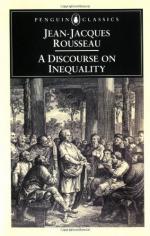
|
| Name: _________________________ | Period: ___________________ |
This quiz consists of 5 multiple choice and 5 short answer questions through Chapter 2, A Discourse on the Moral Effects of the Arts and Sciences, Part II.
Multiple Choice Questions
1. Slavery makes people tend to be what according to "Chapter 1, A Discourse on the Moral Effects of the Arts and Sciences, Part I"?
(a) Angry.
(b) Equal.
(c) Civilized.
(d) Affiliated.
2. According to Rousseau, in the revival, the arts and sciences existed under what entities?
(a) Government and the law.
(b) Reason.
(c) Power and religion.
(d) Reason and religion.
3. According to Rousseau, what ancient thinker praised ignorance?
(a) Plato.
(b) Socrates.
(c) Aristotle.
(d) Hermes.
4. What makes motives hard to discern in the modern age, according to Rousseau?
(a) Beauty makes one work harder.
(b) Society is larger and uncertainty conceals vices.
(c) Talent and beauty are not defined.
(d) Talent is defined, but not beauty.
5. What civilizations does Rousseau follow to track the decline of morality?
(a) The English and Greeks.
(b) The Romans and Germans.
(c) The Romans and Greeks.
(d) The Germans and Irish.
Short Answer Questions
1. What does luxury generate according to "Chapter 2, A Discourse on the Moral Effects of the Arts and Sciences, Part II"?
2. What does Rousseau consider to see if the contradiction he found was true?
3. Who did Rousseau praise for his ignorance in "Chapter 1, A Discourse on the Moral Effects of the Arts and Sciences, Part 1"?
4. What does Rousseau see as possibly contradictory in "Chapter 1, A Discourse on the Moral Effects of the Arts and Sciences, Part I"?
5. Human morals are not improved by what subject according to Rousseau?
|
This section contains 257 words (approx. 1 page at 300 words per page) |

|




